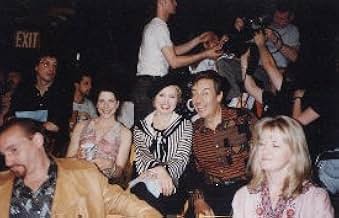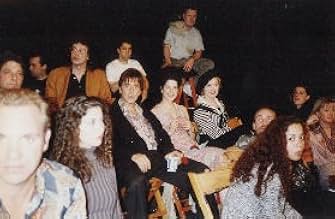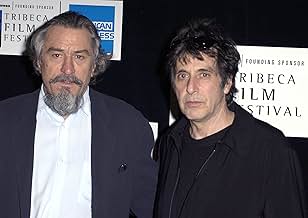NOTE IMDb
7,0/10
4,9 k
MA NOTE
Ajouter une intrigue dans votre langueHarry and Jake, two unsuccessful writers, spend a cathartic evening arguing about money, aesthetics, their friendship, and Harry's new manuscript.Harry and Jake, two unsuccessful writers, spend a cathartic evening arguing about money, aesthetics, their friendship, and Harry's new manuscript.Harry and Jake, two unsuccessful writers, spend a cathartic evening arguing about money, aesthetics, their friendship, and Harry's new manuscript.
Hazelle Goodman
- Cafe Dante waitress
- (as Hazel Goodman)
Avis à la une
Eight-time Oscar-nominated, Tony-winning master actor Al Pacino draws from off-off- Broadway this semi-autobiographical character study and boasts a cast of actors who've proved themselves before and after, a Greenwich Village setting, and thus the world of floundering poets, bartenders, belly dancers, photographers, jealous doormen, haughty Shakespearean quotes, urbane coffee shops and French restaurants. And yet not all of these intermingle naturally within the story, but are forced by a tug-of-war between the play Ira Lewis had written and the film Al Pacino wanted to make.
The narrative is almost exclusively as a one-on-one conversation between the two main characters, yet it is littered with various ineffectual camera angles and at times redundant flashbacks that add nothing to the story, which apparently relates the rapport, romance and failure in the pathetic mid-life of a failed writer barely making ends meet as a doorman, that is, until he is fired. It does so as if such cerebral notions of life would pull the emotional triggers they do here between the writer, Harry Levine, played by Pacino, and his friend Jake Manheim, a photographer played by Jerry Orbach. The result is that, yes, some arresting moments and observations are produced, but they feel nonetheless forced. As director, Pacino brings to bear a periodically overwrought utilization of cuts in the dialogue scenes with Harry and Jake, and so perhaps it is not the words themselves, but the prevention of their taking priority that causes them to seem contrived.
Harry visits Jake impulsively because he is desperate for money and Jake owes him some from a long time ago. He doesn't have the money, so the two engage in an all-night conversation about the aesthetics and troubles of their separate trades, past and present loves, and the directions their lives are taking. The play and film are set in New York City circa 1985. Why? I don't know.
After years of withholding it, Pacino allowed it to be released as a part of a three-movie boxed set called Pacino: An Actor's Vision. Though I see why he might not have been happy with his work, the film stands as testimony that art-house and independent films need not be about overrefined individuals, for Harry and Jake are, from what I could tell, animatedly high-handed men who have merely outlived their functions in society. This is decidedly the case for Jake, but whether or not it is for Harry seems the question of the film.
The narrative is almost exclusively as a one-on-one conversation between the two main characters, yet it is littered with various ineffectual camera angles and at times redundant flashbacks that add nothing to the story, which apparently relates the rapport, romance and failure in the pathetic mid-life of a failed writer barely making ends meet as a doorman, that is, until he is fired. It does so as if such cerebral notions of life would pull the emotional triggers they do here between the writer, Harry Levine, played by Pacino, and his friend Jake Manheim, a photographer played by Jerry Orbach. The result is that, yes, some arresting moments and observations are produced, but they feel nonetheless forced. As director, Pacino brings to bear a periodically overwrought utilization of cuts in the dialogue scenes with Harry and Jake, and so perhaps it is not the words themselves, but the prevention of their taking priority that causes them to seem contrived.
Harry visits Jake impulsively because he is desperate for money and Jake owes him some from a long time ago. He doesn't have the money, so the two engage in an all-night conversation about the aesthetics and troubles of their separate trades, past and present loves, and the directions their lives are taking. The play and film are set in New York City circa 1985. Why? I don't know.
After years of withholding it, Pacino allowed it to be released as a part of a three-movie boxed set called Pacino: An Actor's Vision. Though I see why he might not have been happy with his work, the film stands as testimony that art-house and independent films need not be about overrefined individuals, for Harry and Jake are, from what I could tell, animatedly high-handed men who have merely outlived their functions in society. This is decidedly the case for Jake, but whether or not it is for Harry seems the question of the film.
Film that was adapted from a play and which shows, with the film delving into the life of Pacino's character along with his friendship with Jake and his life with his lover who has left him. The film is a locked room story, which interspersed with curious editing choices which always elevated the story and kept it interesting. But overall, the film is a great watch for Pacino aficionado's and people interested in the life of writers.
As most of all the movie, is about two friends and what their life amounts to in the end, and all the disappointments and vindications you have about yourself and others.
As most of all the movie, is about two friends and what their life amounts to in the end, and all the disappointments and vindications you have about yourself and others.
10tfmiltz
This movie will require many revisits to fully appreciate it.
Tempted to call it 'My room' or heh - 'My room with a view'.
No spoilers here - not that this movie has any.
Do not miss this experience.
Forget waiting for Godot - I think he shows up in this one.
Just a masterpiece.
I really don't have any words beyond that, short of Thank you Al Pacino for working on this and bringing it to light.
All I can say is - watch this, maybe watch it over some period of time - in pieces.
Tempted to call it 'My room' or heh - 'My room with a view'.
No spoilers here - not that this movie has any.
Do not miss this experience.
Forget waiting for Godot - I think he shows up in this one.
Just a masterpiece.
I really don't have any words beyond that, short of Thank you Al Pacino for working on this and bringing it to light.
All I can say is - watch this, maybe watch it over some period of time - in pieces.
Well I just loved the Chinese Coffee for its brilliant acting and direction. It reminded me of the theater of the Absurd in a strange haunting way! With Chinese Coffee Mr. Pacino surpasses his own status of being a stellar performer & a superstar combined and cements his position as one of the greatest artists of all times.
The tone of the movie is intimate and artistic at times a little dark. I loved the stream of Levine's consciousness which makes the audiences look into his past---his hopes & failures. Pacino is brilliant as a middle aged struggling writer who is haunted by his own past, his parents' and his own shortcomings and aspirations.
Kudos to Mr. Pacino for providing us with such a brilliant artistic piece! He truly is a gem of an artist. Love him! God bless!
The tone of the movie is intimate and artistic at times a little dark. I loved the stream of Levine's consciousness which makes the audiences look into his past---his hopes & failures. Pacino is brilliant as a middle aged struggling writer who is haunted by his own past, his parents' and his own shortcomings and aspirations.
Kudos to Mr. Pacino for providing us with such a brilliant artistic piece! He truly is a gem of an artist. Love him! God bless!
Harry Levine (Al Pacino) and Jake Manheim (Jerry Orbach), two unsuccessful writers, spend a cathartic evening arguing about money, aesthetics, their friendship, and Harry's new manuscript.
This film, based on a Broadway play (which had starred Pacino) is well-adapted by director Al Pacino (it helps that there was minimal stuff to direct). The origin as a play is fairly obvious, given how much is talk and how little is action (and I wonder if they had to add or modify scenes to create additional movement and scenery).
While not one of the greatest films ever, and not even one of Pacino's best, it has its moments and it is a great interaction between two people. If you like a lot of dialogue and bickering (think "Clerks" without all the dirty talk) and miss Jerry Orbach, this is the film for you.
This film, based on a Broadway play (which had starred Pacino) is well-adapted by director Al Pacino (it helps that there was minimal stuff to direct). The origin as a play is fairly obvious, given how much is talk and how little is action (and I wonder if they had to add or modify scenes to create additional movement and scenery).
While not one of the greatest films ever, and not even one of Pacino's best, it has its moments and it is a great interaction between two people. If you like a lot of dialogue and bickering (think "Clerks" without all the dirty talk) and miss Jerry Orbach, this is the film for you.
Le saviez-vous
- GaffesNear the end of the film Harry is poured a full glass of seltzer with a lime in it by Barney. Although he does not touch it, the glass is empty when he gets up to leave.
- Citations
Jake Manheim: I'm exhausted from being exhausted.
- ConnexionsReferenced in Biography: Al Pacino: Inside Out (2001)
- Bandes originalesPalm Court
Written by Aaron Briggs (as Briggs), Alan Briggs (as Briggs) and Paul Williams (as Williams)
Courtesy of Opus 1 Production Music and Amphonic Music Limited (ASCAP)
Meilleurs choix
Connectez-vous pour évaluer et suivre la liste de favoris afin de recevoir des recommandations personnalisées
- How long is Chinese Coffee?Alimenté par Alexa
Détails
- Durée1 heure 39 minutes
- Couleur
- Mixage
- Rapport de forme
- 1.85 : 1
Contribuer à cette page
Suggérer une modification ou ajouter du contenu manquant





























